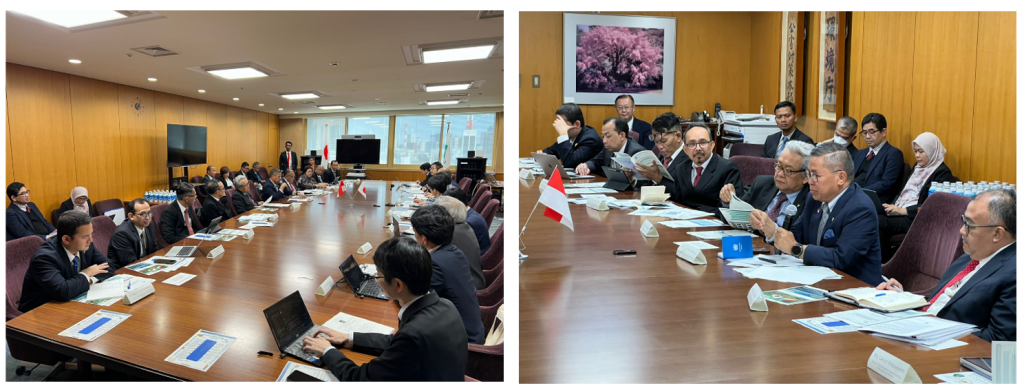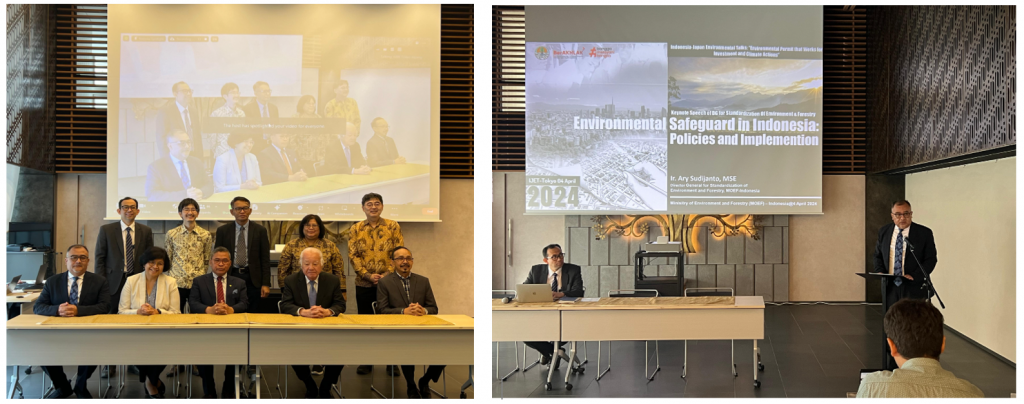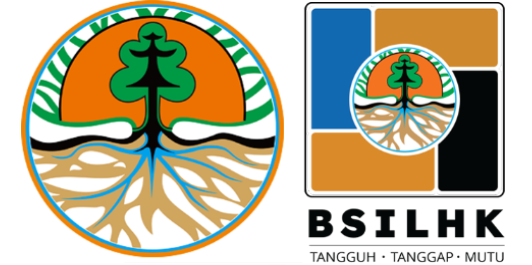
Facing currently raised environmental challenge, Indonesia and Japan recalled the Memorandum of Cooperation (MoC) on Environmental Cooperation. Met in Tokyo further talked about pollution control, waste management, climate change, lake management, tourism promotion, conservation, and law enforcement – expected that would be met in action. Indonesia also underlined the Environmental Safeguards on Business growth in Indonesia. Standardisation plays a key role.
In a landmark event held on April 2, 2024, the Ministry of Environment and Forestry of Indonesia and the Ministry of the Environment of Japan convened a High-Level Environmental Dialogue, aimed at fostering collaboration on environmental issues. The dialogue held in Tokyo, which brought together key stakeholders from both countries, marked a significant milestone in their ongoing partnership.
During the dialogue, Vice Minister of Environment and Forestry of the Republic of Indonesia, Dr. Alue Dohong, highlighted the rich history of cooperation between Indonesia and Japan. He emphasized the importance of the Memorandum of Cooperation (MoC) on Environmental Cooperation signed in August 2022 as a testament to their shared commitment to addressing environmental challenges. He noted that the mid-term stage of this cooperation presented an opportune moment to review progress and discuss strategies for implementing the MoC effectively. He expressed confidence that the dialogue would deepen understanding between the two countries, strengthen their partnership, and pave the way for effective collaboration.
The dialogue covered a wide range of areas under the MoC, including pollution control, waste management, climate change, lake management, tourism promotion, conservation, and law enforcement. He provided an overview of progress in pollution control, highlighting discussions on air quality protection management plans and water quality management.
In the area of climate change, Dr. Dohong urged both parties to actively pursue opportunities for cooperation. He emphasized Indonesia’s commitment to combatting climate change, including ambitious targets for reducing emissions and efforts to establish long-term strategies for low-carbon development

He also addressed collaboration on hazardous substance management, noting ongoing projects with Japan on mercury management and expressing hope for further discussions on this matter.
Highlighting active engagement in solid waste management, He welcomed the establishment of a feasibility study for a large-scale waste treatment facility in the BEKARPUR (Bekasi Karawang Purwakarta) area. He also mentioned discussions on waste management related to disasters and household waste containing hazardous materials.
The Vice Minister emphasized the importance of environmental sustainability in supporting Indonesia’s development efforts, particularly in light of significant foreign investment in the country. He outlined government regulations mandating compliance with environmental standards and underscored the role of environmental planning in promoting sustainable development.
He concluded his remarks by urging Japan to demonstrate leadership in global biodiversity conservation efforts, including contributions to the Global Biodiversity Fund and direct support for biodiversity conservation in Indonesia.
During the dialogue, The Ministry of Environment, Japan (MOEJ) was actively updating stakeholders on the progress of ongoing projects including the Joint Crediting Mechanism (JCM) and the Article 6 Implementation Partnership. The fundamental concept of the JCM revolves around facilitating the dissemination of cutting-edge decarbonization technologies and infrastructure by Japanese entities.
This initiative aims to significantly contribute to greenhouse gas (GHG) emission reductions or removals and promote sustainable development in partner countries. Additionally, the JCM seeks to support the fulfilment of both countries’ Nationally Determined Contributions (NDCs) while ensuring the prevention of double counting through corresponding adjustments.
The implementation of the JCM is aligned with the cooperative approaches outlined in Article 6, paragraph 2 of the Paris Agreement. Currently, the JCM boasts partnerships with approximately 29 countries, including Indonesia. Under the umbrella of JCM financing programs, a diverse array of projects is being supported, encompassing areas such as renewable energy, energy efficiency, waste management, and transportation.
Indonesia-Japan Environmental Talks 2024

During the series of meetings in Tokyo, Ary Sudijanto, the Director General for Standardization of Environment and Forestry Instruments, delivered messages on Environmental Safeguards in Indonesia – Policies and Implementation. Serving as the keynote speaker at the Indonesia-Japan Environmental Talks held on April 4, 2024, he underscored the significant impact of Law No. 06 of 2023, also known as the Indonesian Job Creation Law or Omnimbus Law
He emphasized that the most notable change by the enactment of this law is the simplification of the process to issue permits to business entities, coupled with the strengthening of environmental safeguards. As an implementing regulation, Government Regulation No. 22 of 2021 focusing on environmental protection and management. By this regulation, the burden of environmental safeguard shifts from the business entities to the government. Previously, the environmental safeguards are the full burden and responsibility of business entities/proponent. With the new systems of environmental safeguards, such burdens and responsibility are shared between business entities/proponents and the government with the concept trust but verified.
Sudijanto noted all the economic activities as engines of growth shall be conducted in sustainable manner and environmental sound to ensure landscape and seascape sustainability, indicated by good and healthy environment of 5 (five) focal areas, which is atmosphere/air, land, water, marine and biodiversity.
He urged the environmental safeguard through the environmental and forestry standardization at the landscape-seascape level (macro standards) and the project level (micro standards). Such as standards on environmental pollution and degradation, standards on environmental technologies for control environmental pollution and degradation, standards for environmental monitoring, standards for environmental management systems [EMS] and Environmental Impact Assessment-EIA standards for specific project/business activities.
Sudijanto also mention the new environmental safeguard system of EIA based the Omnibus Laws is also applied to create sustainable infrastructure developments of The New Capital of Indonesia [IKN] that can prevent environmental impacts and protect as well as maintain the environment. Some specific EIA related standards for IKN have been developed and implemented.
Attended at the meeting some key figures – there were Director for Prevention of Environmental and Sectoral Policy Impacts, Director for Prevention of Environmental Business, and Activities’ Impacts, Executive Secretary for Directorate General of Solid Waste, Hazardous Waste and Hazardous Substances management Deputy Director for International Cooperation Bureau and Forestry Attache of Indonesian Embassy in Tokyo.
Indonesia-Japan Environmental Talks co-organized by the Indonesian Embassy in Tokyo and the Institute for Global Environmental Strategies (IGES), and supported by various stakeholders including the MIDORI Association, the Indonesian Ministry of Environment and Forestry, the Intergovernmental Panel on Climate Change (IPCC), and the Nusantara Capital City Authority (OIKN).
Writer: Uus Danu Kusumah, Tutik Sriyati
Contributor: Riva Rovani
Editor: Yayuk Siswiyanti
